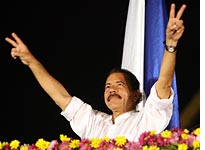On the Campaign Trail in Nicaragua
MANAGUA, Nicaragua—It's an incredible comeback. Sixteen years after Nicaraguans threw the Sandinistas out of the office, the preliminary vote count is projecting Daniel Ortega to be the next president of Nicaragua. Give the man credit for tenacity: This is his third consecutive presidential bid since being trounced in the 1990 election. He faced fierce opposition from U.S. policy-makers, who threatened to cut off the money Nicaraguans in the United States send back to relatives if Ortega won. But a combination of savvy politics, luck, and strong support from this country's impoverished citizens has apparently once again made Ortega the most powerful man in Nicaragua.
In the next few days, some analysts will cast this election as one more example of Latin America's lurch to the left. To be sure, Venezuelan President Hugo Chávez played a role in Ortega's election; there are rumors that in addition to providing oil and fertilizer to poor Nicaraguans, the Venezuelan also paid for a chunk of Ortega's campaign costs. But this election had much more to do with internal Nicaraguan dynamics than a broader regional realignment.
For one thing, Ortega was lucky in his enemies. One of the biggest factors in his triumph was the fact that two right-leaning candidates were on the ballot, diluting the anti-Ortega vote. Washington's anointed standard-bearer, former banker and government minister Eduardo Montealegre, offered "I am not Daniel Ortega" as the principal rationale for his candidacy. While that may have been effective if voters had faced a straight-up choice between Montealegre and Ortega, it wasn't going to cut it when Nicaraguans had several ways to cast an anti-Ortega vote. He was also fortunate that Herty Lewites, a left-leaning candidate who could have emerged as his toughest competition, died of a heart attack this summer.
In the end, though, Ortega owes his presidency to Nicaragua's poor. The destitution in this country is stunning. Eighty percent of the population lives on less than $2 a day, as is brutally evident throughout Managua. Swaths of the city are crowded with shacks made of street signs and rusted corrugated tin sheets. Emaciated dogs limp along the dirt roads, which are often lined with sopping trash. It is the rainy season here, and after the inevitable afternoon downpours, you can occasionally see children splashing around in the filthy refuse that builds up in gutters.
At a polling station just up a hill from one of these shantytowns, most voters seemed desperate for an Ortega triumph. "Hopefully, this will be the year we see change," said one heavyset woman, who supports her family by packaging snacks that her husband then sells on the street. "I know people complain about Daniel, but back [in the 1980s] at least there was free education, and you could go to the hospital. Now we have nothing," she added, as a poll worker ushered her away before I could get her name.
About 15 minutes away by car, in the upper-middle-class neighborhood of Las Colinas, the crowd looked very different—and, unsurprisingly, voters' recollections of the Sandinista government were not as felicitous. Several of them had relocated to the United States while the Sandinistas were in power and didn't return until Ortega had been booted out. "I know he says he's changed," said Rodrigo Lacayo, an architect and builder who lived in Miami from 1981 to 1995. "But we can't have growth in this country without foreign investment. And we know what happened under the Sandinistas last time."
Is the past a blueprint for Ortega's next term in office? The world has changed since the then-33-year-old guerrilla fighter triumphantly rolled into Managua in 1979. While Venezuela will extend some aid, President Chávez won't be a sugar daddy on the scale of the former Soviet Union. A return to socialism simply isn't feasible, and besides, Ortega has said he will oversee some version of a market economy. The Sandinistas facilitated the Nicaraguan parliament's ratification of the Central American Free Trade Agreement, and some members of the party are actively involved in the development of the country's burgeoning tourist economy. International investment will probably dry up over the next few months, as governments and businesses adopt a wait-and-see stance, but the country is unlikely to return to the days when basic commodities were scarce and private investment essentially nonexistent.
It's unclear how Ortega will fulfill his promises to change the lives of his poor constituents. He made sweeping promises on the stump, pledging that energy blackouts would end and unemployment—which officially stands at 12 percent—would diminish. If there is a constant in Nicaragua, it's politicians swearing that a new day is coming. But little is ever done to help the country's most destitute.
And the lives of some Nicaraguans are truly wretched. The most depressing encounter I had here wasn't in Managua, but somewhat incongruously in Granada, a picturesque tourist city about 45 minutes outside the capital. It was there that I met a little boy selling grasshopper trinkets he'd fashioned out of thick blades of grass. As he wolfed down some food a Nicaraguan journalist friend and I had given him, he fielded our questions. His address? Generally, he lived by the side of a highway. His mother was dead; his father had disappeared. He wasn't sure where, exactly. "In the south, I think," he said as he crammed toast and potatoes into his mouth. He was also unclear about his age; he guessed he was around 7.
At this point, he dropped his bread onto the road and then swiftly picked it up and put it into his mouth. "Don't!" we yelled. "Oh, right, there are dogs that walk by here?" the kid mused. We gave him more money, with my friend urging him to spend the cash on food. "No drugs, OK?" she said. He nodded his head vigorously and, despite our protestations, took another bite of the toast that was now visibly stained with dirt.
